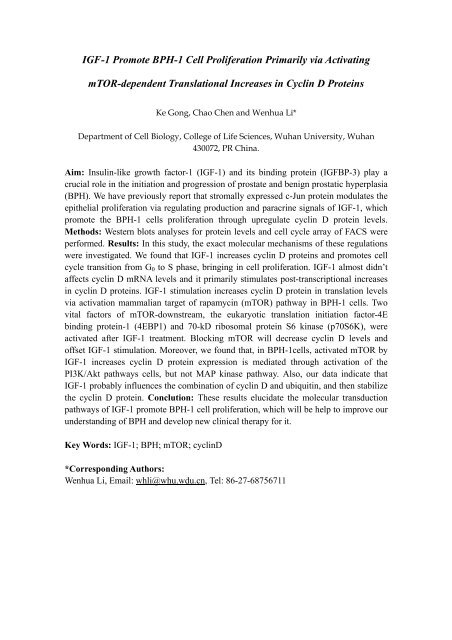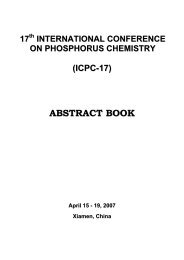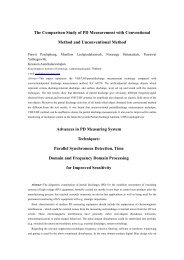New Modes of GPCR Signalling
New Modes of GPCR Signalling
New Modes of GPCR Signalling
You also want an ePaper? Increase the reach of your titles
YUMPU automatically turns print PDFs into web optimized ePapers that Google loves.
IGF-1 Promote BPH-1 Cell Proliferation Primarily via Activating<br />
mTOR-dependent Translational Increases in Cyclin D Proteins<br />
Ke Gong, Chao Chen and Wenhua Li*<br />
Department <strong>of</strong> Cell Biology, College <strong>of</strong> Life Sciences, Wuhan University, Wuhan<br />
430072, PR China.<br />
Aim: Insulin-like growth factor-1 (IGF-1) and its binding protein (IGFBP-3) play a<br />
crucial role in the initiation and progression <strong>of</strong> prostate and benign prostatic hyperplasia<br />
(BPH). We have previously report that stromally expressed c-Jun protein modulates the<br />
epithelial proliferation via regulating production and paracrine signals <strong>of</strong> IGF-1, which<br />
promote the BPH-1 cells proliferation through upregulate cyclin D protein levels.<br />
Methods: Western blots analyses for protein levels and cell cycle array <strong>of</strong> FACS were<br />
performed. Results: In this study, the exact molecular mechanisms <strong>of</strong> these regulations<br />
were investigated. We found that IGF-1 increases cyclin D proteins and promotes cell<br />
cycle transition from G0 to S phase, bringing in cell proliferation. IGF-1 almost didn’t<br />
affects cyclin D mRNA levels and it primarily stimulates post-transcriptional increases<br />
in cyclin D proteins. IGF-1 stimulation increases cyclin D protein in translation levels<br />
via activation mammalian target <strong>of</strong> rapamycin (mTOR) pathway in BPH-1 cells. Two<br />
vital factors <strong>of</strong> mTOR-downstream, the eukaryotic translation initiation factor-4E<br />
binding protein-1 (4EBP1) and 70-kD ribosomal protein S6 kinase (p70S6K), were<br />
activated after IGF-1 treatment. Blocking mTOR will decrease cyclin D levels and<br />
<strong>of</strong>fset IGF-1 stimulation. Moreover, we found that, in BPH-1cells, activated mTOR by<br />
IGF-1 increases cyclin D protein expression is mediated through activation <strong>of</strong> the<br />
PI3K/Akt pathways cells, but not MAP kinase pathway. Also, our data indicate that<br />
IGF-1 probably influences the combination <strong>of</strong> cyclin D and ubiquitin, and then stabilize<br />
the cyclin D protein. Conclution: These results elucidate the molecular transduction<br />
pathways <strong>of</strong> IGF-1 promote BPH-1 cell proliferation, which will be help to improve our<br />
understanding <strong>of</strong> BPH and develop new clinical therapy for it.<br />
Key Words: IGF-1; BPH; mTOR; cyclinD<br />
*Corresponding Authors:<br />
Wenhua Li, Email: whli@whu.wdu.cn, Tel: 86-27-68756711












